| Srl | Item |
| 1 |
ID:
117988
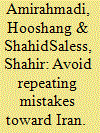

|
|
|
|
|
| Publication |
2013.
|
| Summary/Abstract |
The United States and Iran have been locked in a historically rare relationship: Washington and Tehran have not been able to talk to each other in a meaningful and consistent way. This pattern was not seen even during the Cold War between the United States and its communist adversaries. If the factors which have perpetuated this state of non-communication (or failing engagement) continue to go ignored, it is unreasonable to expect a negotiated solution in the coming months or years. This essay seeks to answer three questions: First, why have Iran and the United States been unable to engage in sustained dialogue aimed at détente and minimal cooperation? Second, why will current U.S. policies toward Iran's nuclear program likely fail, leading to a war that would make Iran weaponize? Third, what strategies and policies should be implemented to end the standoff over Iran's nuclear program, and facilitate détente between the two countries?
|
|
|
|
|
|
|
|
|
|
|
|
|
|
|
|
| 2 |
ID:
112339
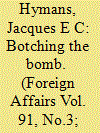

|
|
|
|
|
| Publication |
2012.
|
| Summary/Abstract |
Nuclear weapons are hard to build for managerial reasons, not technical ones. This is why so few authoritarian regimes have succeeded: they don't have the right culture or institutions. When it comes to Iran's program, then, the United States and its allies should get out of the way and let Iran's worst enemies -- its own leaders -- gum up the process on their own.
|
|
|
|
|
|
|
|
|
|
|
|
|
|
|
|
| 3 |
ID:
108625
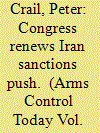

|
|
|
|
|
| Publication |
2011.
|
| Summary/Abstract |
Following U.S. accusations on Oct. 11 that elements of Iran's government conspired to assassinate the Saudi ambassador to the United States, members of Congress reiterated calls to increase sanctions on foreign firms doing business with Iran.
Obama administration officials insisted that they were taking steps to strengthen sanctions against Iran in response to the alleged plot and Iran's nuclear program.
|
|
|
|
|
|
|
|
|
|
|
|
|
|
|
|
| 4 |
ID:
150098


|
|
|
|
|
| Summary/Abstract |
Iran's nuclear program survived, and the American decision to concentrate on ISIS in both Syria and Iraq has been at the expense of blocking Iran in both those countries. Sunni-led Arab states tolerate the pro-Iranian regime in Baghdad but in Syria they want to topple Assad and by that also to inflict a blow to Iran's position in the Levant. Israel has been dealing with an Iranian partner, Hamas, but several major constraints prevent Israel from crushing this outfit.
|
|
|
|
|
|
|
|
|
|
|
|
|
|
|
|
| 5 |
ID:
142988
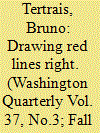

|
|
|
|
|
| Summary/Abstract |
In the past two years, the expression “red line” has become a regular feature of the global policy debate. So much so that it risks becoming a punch line. Red lines have appeared in discussions about the Ukraine crisis, Iran's nuclear program, and Syrian use of chemical weapons. President Obama famously stated in 2012 that “a red line for us is we start seeing a whole bunch of chemical weapons moving around or being utilized.”
|
|
|
|
|
|
|
|
|
|
|
|
|
|
|
|
| 6 |
ID:
134081
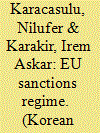

|
|
|
|
|
| Publication |
2014.
|
| Summary/Abstract |
Although there is enormous discussion on normative power Europe, there is relatively less focus on the EU sanctions regime, though sanctions have become a useful foreign policy tool as the EU has applied sanctions within the framework of the Common Foreign and Security Policy. Looking at the literature, Kreutz focused on the EU sanctions regime in the time period of 1981-2004, during which sanctions
were used to accomplish normative goals. Yet, later on Brummer argued that although norms and values still play a role in the EU's sanctions regime, more often they were surpassed by security and economic interests. This article examines the previous work on the EU sanctions regime and tries to comprehend why the use of sanctions has increased over time as well as whether they have been "selectively" used. In addition, the article analyzes whether the normative commitment is crucial in the construction of the EU sanctions regime. The EU sanctions regime toward Iran is analyzed in particular, because as indicated by Santini and Tabrizi, Iran is the first country against which the EU has developed a new strategy out of weapons of mass destruction concerns, starting in 2006. Since 2010, EU foreign ministers have adopted tougher sanctions in an effort to block its controversial nuclear program. Recently, the Iran nuclear deal of November 2013 was interpreted as attributable to sanctions against Iran, in which EU sanctions have constituted a remarkable role, have proven effective.
|
|
|
|
|
|
|
|
|
|
|
|
|
|
|
|
| 7 |
ID:
115594
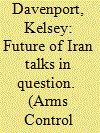

|
|
|
| 8 |
ID:
115805


|
|
|
| 9 |
ID:
115783


|
|
|
| 10 |
ID:
121067
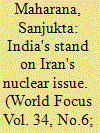

|
|
|
|
|
| Publication |
2013.
|
| Summary/Abstract |
The issue of Iran's nuclear program has been on the top of international agendas during first half of twenty-first century. Iran says that it want and produce nuclear energy for fulfilling its energy needs, the need of electricity as well as medical needs of the country. Iran claimed that as a signatory state of Nuclear Non Proliferation Treaty (NPT) it has the right for the peaceful uses of nuclear energy. But United States of America (USA) termed it as an effort of building nuclear weapons and appeal to the United Nations and other countries to impose restriction on Iran and let the International Atomic Energy Agency (IAEA) for the inspection of Iranian nuclear program. India has been maintaining cooperative relations with Iran and established strategic partnership. On the other hand it has maintained strategic alliance and civil nuclear deal with US. In these circumstances it come to our mind that what type of role India is playing to wards Iran's nuclear issue? This article clearly illustrates the India's position on Iran's nuclear issue.
|
|
|
|
|
|
|
|
|
|
|
|
|
|
|
|
| 11 |
ID:
131605


|
|
|
|
|
| Publication |
2014.
|
| Summary/Abstract |
Intelligence is a critical component for all counter-proliferation activities. It allows us to assess and determine what makes up the current threat environment in terms of the proliferation of nuclear weapons and technology. When informed with an accurate assessment of the situation, policy-makers are better suited to counter the proliferation threat. However, success and failure hinge upon how well information is managed during the intelligence process. The intelligence process as it relates to estimating nuclear capabilities or intentions is wrought with many challenges and complications. The denial and deception techniques employed by states running covert weapons programs and the dual-use nature of many weapons components create many difficulties for intelligence organizations. Additionally, illicit transnational networks obscure the situation further by serving as a source, for both nation states and non-state actors, for acquiring dual-use commodities and technologies. These challenges can lead to the miscalculation of a state's capabilities or intentions, as witnessed with the case of Iraq in 2003 when western intelligence services grossly overestimated the capabilities of Saddam's regime. This paper presents a comparative analysis of three cases of nuclear proliferation: India's 1998 nuclear tests, the exposure of the A. Q. Khan network and Iran's nuclear program. Drawing from the analysis, the authors examine the lessons learned and propose recommendations for future counter proliferation policy and strategy.
|
|
|
|
|
|
|
|
|
|
|
|
|
|
|
|
| 12 |
ID:
131603
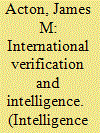

|
|
|
|
|
| Publication |
2014.
|
| Summary/Abstract |
Both national intelligence agencies (NIAs) and international verification organizations (IVOs) attempt to assess compliance with arms control treaties. Their strengths and weaknesses are complementary. Because IVOs are seen as legitimate, they are able to conduct on-site inspections to verify declared activities and to confirm or disprove allegations of clandestine cheating. NIAs are more flexible and have a greater ability to uncover preliminary evidence of clandestine activities on which further investigations can be based. Such investigations require NIAs to share intelligence with IVOs. While this kind of intelligence sharing is generally permitted by arms control agreements, it is controversial. Nonetheless, it appears to have become more common in recent years, particularly during the International Atomic Energy Agency's investigation of Iran's nuclear program. While intelligence sharing creates risks for both IVOs and NIAs, it is ultimately critical to the effective verification of arms control agreements and steps can and should be taken to ensure it becomes more common and less controversial.
|
|
|
|
|
|
|
|
|
|
|
|
|
|
|
|
| 13 |
ID:
107377
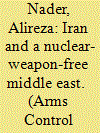

|
|
|
|
|
| Publication |
2011.
|
| Summary/Abstract |
A nuclear-weapon-free zone for the Middle East was first proposed by Iran in 1974.[1] Iran's last reigning monarch, Shah Mohammad Reza Pahlavi, championed the idea of such a zone, perhaps as a way to enhance Iran's leadership role in the region despite his own nuclear ambitions. The Islamic Republic of Iran, which replaced the monarchy in 1979, is believed to be pursuing a nuclear weapons capability despite intense international diplomatic and economic pressure. Nevertheless, Iranian leaders, who claim that Iran's nuclear program is peaceful, have been enthusiastic about the planned 2012 conference on establishing a Middle Eastern zone free of weapons of mass destruction (WMD). The conference could serve Iran's geopolitical interests by providing an opportunity to exploit Arab divisions and shift the focus away from Iran toward Israel's nuclear arsenal, thereby undermining U.S. efforts to stop the Iranian nuclear program.
|
|
|
|
|
|
|
|
|
|
|
|
|
|
|
|
| 14 |
ID:
131601
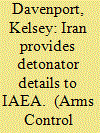

|
|
|
|
|
| Publication |
2014.
|
| Summary/Abstract |
Iran provided the International Atomic Energy Agency (IAEA) with information about the country's past development of a detonator that could be used as a trigger in nuclear weapons, the agency said last month in a quarterly report. The report also found that Iran is complying with the measures outlined in an interim agreement it reached Nov. 24 with six world powers that restricts its nuclear activities in exchange for sanctions relief. The "technical exchange" with the IAEA on the issues related to possible nuclear weapons development was the first since 2008, the May 23 report said.
|
|
|
|
|
|
|
|
|
|
|
|
|
|
|
|
| 15 |
ID:
111977
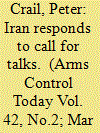

|
|
|
| 16 |
ID:
107379
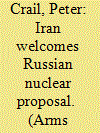

|
|
|
|
|
| Publication |
2011.
|
| Summary/Abstract |
Senior Iranian officials last month welcomed a Russian-proposed "step-by-step" process to address concerns about Iran's nuclear program, a move that could potentially restart talks between six major world powers and Iran.
|
|
|
|
|
|
|
|
|
|
|
|
|
|
|
|
| 17 |
ID:
115745
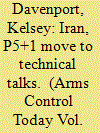

|
|
|
| 18 |
ID:
128081
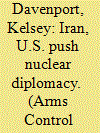

|
|
|
|
|
| Publication |
2013.
|
| Summary/Abstract |
Following a high-level series of diplomatic exchanges and meetings between U.S. and Iranian leaders in late September, both sides say there is a strong basis for a diplomatic resolution to the long-running impasse over Iran's nuclear program. In the highest level of contact between the two governments since 1979, President Barack Obama and Iranian President Hassan Rouhani spoke by telephone about Iran's nuclear program Sept. 27, Obama told reporters at a White House news conference later that day. "While there will surely be important obstacles" and success is not guaranteed, "I believe we can reach a comprehensive solution" to the dispute over Tehran's nuclear program, Obama said.
|
|
|
|
|
|
|
|
|
|
|
|
|
|
|
|
| 19 |
ID:
121692
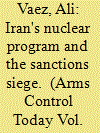

|
|
|
|
|
| Publication |
2013.
|
| Summary/Abstract |
The latest round of nuclear talks between Iran and the P5+1 (the five permanent members of the Security Council plus Germany) in the Kazakh city of Almaty yielded no results. The two sides remained poles apart.
|
|
|
|
|
|
|
|
|
|
|
|
|
|
|
|
| 20 |
ID:
124236
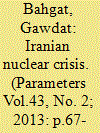

|
|
|
|
|
| Publication |
2013.
|
| Summary/Abstract |
Iran's nuclear program has become the major dispute between the Islamic Republic and global powers, led by the United States. This essay identifies the principal elements in any potential agreement, and outlines the steps needed to enhance the opportunity for a successful negotiation. Rapprochement between Tehran and Washington is not only possible, but indeed, desirable.
|
|
|
|
|
|
|
|
|
|
|
|
|
|
|
|